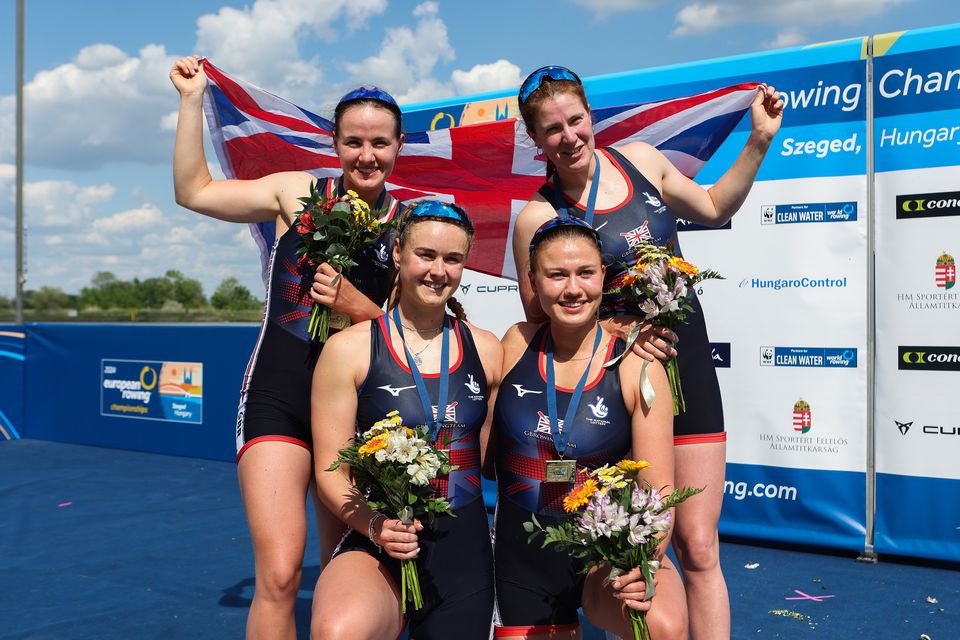A far cry from British Rowing’s state-of-the-art Caversham base, the historic Coleraine boat house has stood since 1842, and from its humble denizens have emerged a rich seam of Olympic medals.
Bann produced brothers Peter and Richard Chambers, who won silver together in the lightweight four at London 2012, and bronze medal-winning sculler Alan Campbell.
These colossal figures weren’t distant, either, with Campbell’s mother the principal at Hannah Scott’s school and her father working with the Chambers brothers.
“Coleraine as a town is really small, and so is the rowing club,” says Scott.
“The facilities aren’t that great, but I think that’s what makes the community stronger.
“The people inside it are the thing I remember the most when I walked in. Yes, everything wasn’t sparkling clean and new, but there was definitely something about it.
“I remember thinking, ‘This is where Olympians have been made’, and a lot of them have been made considering how little it is.
“That’s what excited me and that’s what inspired me to start the sport. Bann was where it all began, that’s where I came from, and that’s where I got the belief that I could do it.”
The National Lottery’s support for grassroots sports clubs like Bann stretches across the United Kingdom and sees players raise around £30million each week for crucial projects.
It is 36 years since Northern Ireland produced an Olympic champion, with Stephen Martin and Jimmy Kirkwood playing their part in men’s hockey gold at Seoul 1988.
The last woman to do so was Lady Mary Peters, no less.
Scott will be aware that she is well-placed to end that drought, heading to her second Olympics at Paris 2024 as a reigning World and European champion in the women’s quadruple sculls.
The Games was always the thing for Scott – contrasting her Olympic obsession with the journey of team-mate and boyfriend Ollie Wynne-Griffith. Wynne-Griffith won bronze in the eight at Tokyo 2020 and will race in the men’s pair in Paris.
“When Ollie started rowing, he did it for fun in the beginning and grew to love it,” said Scott.
“I just find that really weird because from the youngest age, when I watched the Olympics, I just really wanted to be there.
“I didn’t know how, but that was the end destination I wanted. I wanted to see for myself how close I could get. To be talking about going to a second one doesn’t feel real.”
GB quartet Lauren Henry, Hannah Scott, Lola Anderson and Georgina Brayshaw celebrate gold at the European Rowing Championships
Scott’s journey took her to Princeton University, where she not only excelled academically but continued rowing at the highest level, becoming a two-time Ivy League champion as well as captain of the Princeton women’s crew.
She also became a two-time silver medallist at the Under-23 World Championships.
Her final years at university were disrupted by the Covid-19 pandemic, which opened up an opportunity for her to return to the UK.
Scott was fast-tracked into Team GB for her Olympic debut, finishing seventh in the quad six months after joining the senior team. She made a calculated decision to pursue the single sculls in the post-Olympic year and took an excellent fifth at the 2022 World Championships.
“I took a lot from the season in the single,” said Scott. “I was learning so much about myself going down the track in those races, which I think was really valuable for this cycle.
“I ended up fifth in the world and felt there was so much to improve on, and I think I brought that into the quad.
“I had a bit of a quick rise into the team and the Olympics, and it was very turbulent in that regard. That year evened things out and I feel I’ve found my swing now, it helped me improve mentally, physically and technically.”
After a tough Tokyo Olympics across the board, the British women’s programme under Australian head coach Andrew Randell has undergone an overhaul that has yielded instant dividends.
Scott is a fully paid-up member of the Randell fan club.
“The one thing this programme for the women shows is respect for each other,” said Scott.
“If you can get a seat in a crew boat now, there are definitely no passengers.
“All of us have earned our seats and are bringing something unique to that boat.
“There definitely weren’t any passengers before, but every seat has had blood, water, everything thrown at it to get there. We have everything we need in terms of coaching, physio and sports science through the National Lottery, so we have no excuses.
“Before, it was jumping through hoops, but now, everyone has sacrificed something. The programme has been a lot more challenging just to get in the boat and cope with the training itself.”
With more than £30m a week raised for good causes, including vital funding into elite and grassroots sport, National Lottery players support our Olympic and Paralympic athletes to live their dreams and make the nation proud, as well as providing more opportunities for people to take part in sport. To find out more visit: www.lotterygoodcauses.org.uk.
